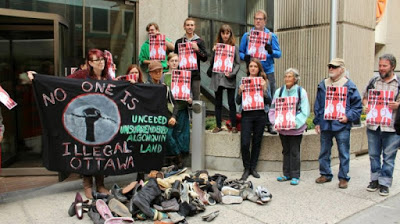Learning from the past, fighting in the present
 |
| CHRIS DIXON – SEPTEMBER 6, 2018 |
“How do you avoid the feeling that you should be working ALL THE TIME given the urgency of the state of the world?” My friend Heather Hax, an experienced activist, recently posted that question on Facebook. This sense of urgency is completely justified, and many of us are feeling it.
We live in a profoundly frightening and unpredictable period, faced with the challenges of colonialism and climate catastrophe, economic austerity and state violence, and emboldened white supremacy and xenophobia.
The election of Ford’s Conservatives in Ontario is just the latest dispiriting episode in an international resurgence of reactionary politics. And although Doug Ford is not Donald Trump, I’m witnessing similar feelings of grief and panic among activists in Ontario as I saw while travelling around the U.S. last year. It’s terrifying to watch the far-right exercising power, both in government and in the streets.
In these circumstances, I’ve been heartened to see activists and organizers turning toward social movement history for lessons and grounding. In Ontario, for instance, there has been renewed interest in learning from the Days of Action and other movement efforts during the Harris years. While I suspect there is still some serious reckoning we have to do with that period, this is definitely a promising approach.
Facing an urgent present, why dig into history? The short answer is that it’s invaluable for helping us to struggle more effectively. In the pace of movements and mobilizations, years can sometimes feel like decades and, with frequent activist turnover, we all too easily end up repeating similar mistakes and debates over and over again. Coming to know movement history can help us to learn from our missteps, build on our strengths and have new discussions that propel us forward.
Let me offer some examples. Looking over recent histories of struggle, here are three lessons relevant to our current circumstances:
First, movements generally grow when they connect individual hardships to systemic realities. Organizing is about helping people to understand the difficulties in their lives as not just bad things happening to them individually, but rather as the result of social relations that benefit some people and hurt others. This is part of what consciousnessraising groups, at their best, achieved in the women’s liberation movement: spaces for women to understand understand their individual hardships as linked to shared experiences of oppression. In fostering such spaces, it’s worth remembering that people tend to respond better to questions about their lives than lectures about them.
Second, movements can generate power when they defend the most vulnerable and build bottomup solidarity. Although the current arrangement of power harms most people in this society, we are not all affected in the same ways. As anti-racist feminists have illuminated, race, class, gender, sexuality, citizenship and ability operate with and through one another in shaping the forms and intensities of hardships that we face. If we want to challenge the system that benefits from our hardships, we have to acknowledge where we’re starting from and enact solidarity practically as we struggle. The experiences of direct-action AIDS activists in Ontario during the early 1990s are instructive here. While fighting to establish public funding for drug access, they refused a government-proposed plan that would have only covered people living with HIV or AIDS; instead, they insisted that it cover all people with catastrophic illnesses and, through persistent and confrontational organizing, they ultimately won.
Third, movements tend to have more far-reaching effects when they are creative and bold. Circumstances are constantly changing and, if we want to intervene in them effectively, we shouldn’t be afraid to renovate old political approaches and try new ones. And sometimes audacity, grounded in solid organizing, can take us a surprisingly long way. I’m thinking here about the efforts of No One Is Illegal- Vancouver Coast Salish Territories in 2007 to support Laibar Singh, a paralyzed refugee from India. That campaign culminated in a stunning action in which some 2,000 people, largely South Asian, blockaded the Vancouver International Airport to stop Singh’s impending deportation. In that action, migrant justice organizers took a bold tactic from European activists and creatively shaped it for their own situation.
There are many more histories to learn from and many more lessons we can draw. Returning to Heather Hax’s question, perhaps one of the most profound lessons to take is this: other people, in other times, faced urgent crises in overwhelming circumstances, lived full lives, fought hard, and won victories. We can too.


